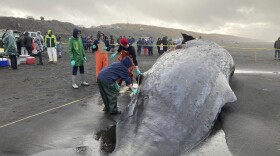-
A people-powered whale alert app has been helping reduce the risk of vessel strikes on whales for more than a decade. Now, an AI powered thermal camera is taking the monitoring to the next level.
-
Gray whales are often seen migrating along the Washington coast. But there’s just one place in the world where people can go to try and touch them.
-
To avoid being found by pods of orcas, some baleen whales sing like baritones.
-
Whales and ships tend to share the same waters, putting the animals at risk for collisions. A study identifies whale-strike “hotspots” around the globe.
-
The U.S. Coast Guard has developed a new system to try to reduce the number of whales hit by vessels. It's a 4-year pilot project in the waters in and around Seattle.
-
The program is an effort to keep the giant marine mammals safe from boat strikes and noise in the highly used inland waters of Washington state.
-
A humpback whale visiting the waters off Seattle gave people on shore a show Thursday morning.
-
The juvenile whale was seen swimming in a clockwise circle, making unusual noises and trailing two buoys. A team of wildlife experts had to move fast, but with plenty of patience, to save its life.
-
A final decision on the Makah whale hunt was expected from the head of NOAA Fisheries by the end of June. An administrative law judge recommended approval two years ago, but the agency has still not released its final environmental impact statement.
-
Three dead whales have washed up on the Oregon coast over the past week. KGW, citing Seaside Aquarium, reports that a baby gray whale washed ashore Wednesday at Fort Stevens State Park, only 100 yards from where a dead sperm whale beached over the weekend. A gray whale also washed up last week on the central coast near Reedsport.
Play Live Radio
Next Up:
0:00
0:00
Available On Air Stations








